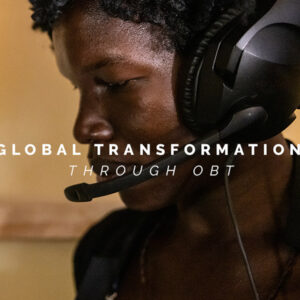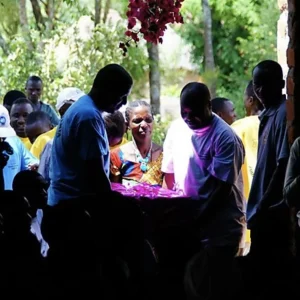For security, pseudonyms are used for some names, locations and languages.
A cow jolts awake, rousted from her spot next to a mud and sticks building on this hot Sunday morning.
Inside, 30 villagers have begun singing, clapping and playing percussion instruments. The 9-by-16-foot structure can’t begin to hold it all. “Come Thou Fount of Every Blessing” wafts throughout this western Indian village.
Under a single light bulb — electricity came just last year — most of the people sit cross-legged on the floor. A few hold Bibles printed in the state language, though most can’t read and they prefer to speak and sing in the local Savias tongue.
Shanta and her 11-year-old daughter, Rose, sit with the other women in back near the door — men and women here typically sit apart for church. Victor stands in front, helping to lead the service. Now and then, he and his wife exchange a knowing glance.
They are Indian, but they are far from home. And the cost has been high.
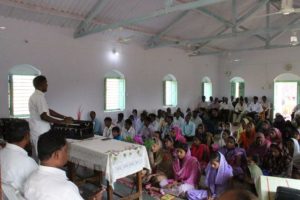
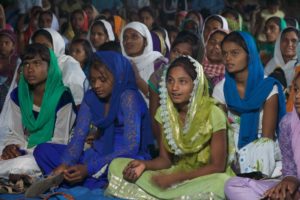
In the early 1990s, Victor was single and working in Mumbai when he sensed a calling to ministry … somewhere. “I didn’t have any idea of where God wanted me to go,” he recalls.
He resigned his job and traveled hundreds of kilometers north to seek advice from his brother, Mark, a missionary and Bible translator who had worked more than 25 years in the area, completing the gospels of Mark and John.
“A servant of God must learn the Bible,” Mark told him — and sent him back to his southern home state, where Victor would pursue coursework in theology. When he completed those studies in 1996, he also married Shanta. They both felt called to ministry but still weren’t sure where.
So they prayed together for a whole year while ministering at their local church in their home state. During that time, Mark told them about the need for Bible translators in a western state, specifically the village of Darakhan.
Not long after, Victor attended a linguistics course — and promptly met two other Christian men from that same small, far-away village. Seeing that as a clear sign from God, Victor and Shanta moved to Darakhan.
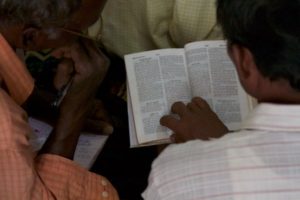 The culture shock would be severe. Victor and Shanta’s home state boasts high literacy, low poverty and one of India’s highest standards of living, with a higher-than-average percentage of Christians. The state where they now would live has more than three times the people but barely a Christian population. In many of the rural villages, oxcarts and mud dwellings outnumber cars and clean wells. Malaria, tuberculosis, typhoid and even leprosy run rampant.
The culture shock would be severe. Victor and Shanta’s home state boasts high literacy, low poverty and one of India’s highest standards of living, with a higher-than-average percentage of Christians. The state where they now would live has more than three times the people but barely a Christian population. In many of the rural villages, oxcarts and mud dwellings outnumber cars and clean wells. Malaria, tuberculosis, typhoid and even leprosy run rampant.
The region’s Christian population varies widely from village to village. Missionaries and churches are familiar, but the Bible in the local language is notably absent. “They don’t have good, deep-rooted faith,” Victor says. “Christians also need the Gospel.”
When Victor and Shanta arrived in Darakhan, the people assumed they were rich because of where they came from. Not so. With the 100 rupees ($1.50 USD) he had in his pocket, Victor bought some spoons, sugar and tea powder. That was their food for three days: black tea.
Finally, a girl came by with a container full of rice and dal curry — leftovers from a nearby wedding. In the coming days, local Christians heard about Victor and Shanta and began helping them. That brought the couple to tears.
“I didn’t cry because of starvation, but because of the amazing love they all had shown us,” Victor says. “This incident helped me reaffirm that God had chosen us for this place.”
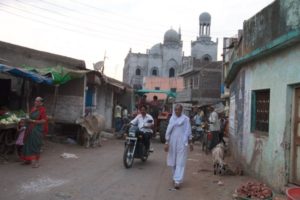
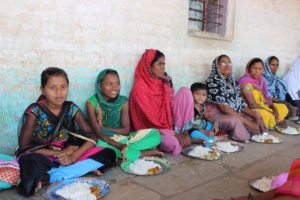
The first three years of their marriage, Victor and Shanta tried unsuccessfully to have a child. Amid family pressure, they moved back to their home state to undergo treatments — without success. They worked in church ministry there, but worried about the region they had left.
“Sometimes I wasn’t very faithful to God,” Victor says. “Finally we came to the Lord. We asked for forgiveness for all that happened and said we would really like to go back to where He has called us. But before that, please give us a child. “And in the next year, God gave us Rose.”
When Rose turned a year old, the family moved back to Darakhan. “These experiences gave me more faith and trust in the Lord,” Victor says.
Not that life would get easier. Dust blew constantly from the dry streets into the rickety house they rented. The contents of that dust led to multiple bouts of typhoid and tuberculosis for Rose, along with malaria from mosquitoes.
They’ve since moved to a concrete apartment building. It’s better, but it’s not their home state by a long shot. Rose’s health has improved, but she still gets sick more than normal. The water tank for their building gets filled from a nearby well twice a week, but runs out quickly. In the dry winter months, the well itself runs dry.
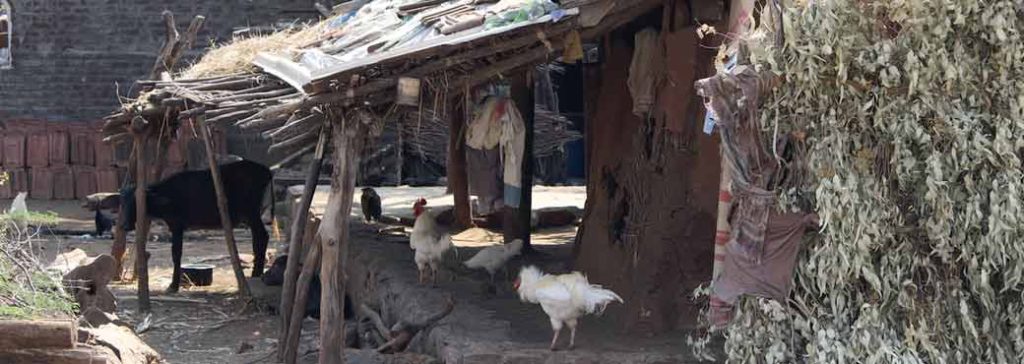
In 55 villages here, about a million people speak various dialects of Savias. Victor serves as Bible translation facilitator for the whole area, working with a team of three brothers who are Bible translators. There is no printed Bible in Savias yet, but they’ve almost completed a first draft of the New Testament. Having local Bible translators has made all the difference; previously, someone like Victor’s brother had to spend his first five to 10 years there just learning the language.
As New Testament translation progresses, the four men also have been instrumental in leading the translation of the “JESUS” film into Savias (one of hundreds of languages for the film, the most-watched of all time). Victor and Shanta’s apartment doubles as workspace, so all of the recording happened here in a closet-sized, makeshift studio lined with old mattresses.
When the film was completed last year, Victor visited a local tailor and bought enough white fabric to sew together a 10-by-8-foot rectangle to serve as a screen. Over the following three months, they showed the film outdoors more than 50 times in villages. It’s the only movie the people have ever seen in their own language. The early response has been enthusiastic among believers and nonbelievers alike, Victor says, with requests for more showings.
After watching scenes of some of Jesus’ miracles and teachings, villagers have asked Victor if all of that is really in the Bible. He longs to help them read the story for themselves. Only about five in 100 people here are literate, and no literature exists in the mother tongue, Savias. Victor prays that a Savias Bible can be used not only to draw people to God, but also to teach them to read.
In the meantime, he and the translators are developing a podcast: audio Bible stories, songs and teaching on SD cards that can play on cellphones. As Scripture gets translated into Savias, Victor hopes to share audio portions every week with anyone interested.
He also leads youth groups in the villages, teaching songs, giving Bible quizzes and helping the kids study newly translated Scripture fresh off the copy machine.

One of those villages is Charkob, where on this sunny Saturday morning about 100 Christians gather for worship in a wood-frame church. Today’s is a special meeting for pastors, leaders and their families from many of the area’s 53 churches. Among the congregation, the songbooks are in Hindi. The few people carrying Bibles have the state language version. But among the congregation, some hold those precious photocopies: the book of Philippians, newly translated into the local Savias language.
Victor dreams of a day when people will carry — and read — full Savias Bibles. He’s come to realize that God put him here to continue his brother’s work of getting Scripture to people in their own language.
“I can divide my ministry into two parts: before being involved in translation and after being involved,” Victor says. “Whatever I have now — the fellowship of the people, the support of the people and everything else — is all because of translation.”
For her part, Shanta never imagined that working as a missionary would bring her to a place like this. At first, she had a hard time adapting to the language, culture and people, let alone the living conditions for their family.
“It was a big struggle for me,” she says, “but Victor encouraged me, and now I feel that living in a village is much better than living in a town or city.”
As the two talk about their life and ministry, Victor is asked if the comfort of their home state still beckons.
“Home? Now whenever I go there, I feel restless,” he says. “I just want to get back here soon. This is our place. This is our home now.”
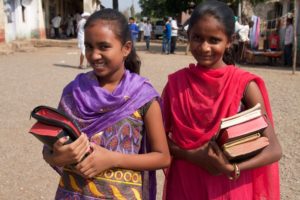
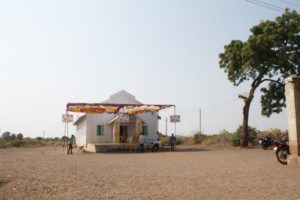
Story by Joel M. Jacob and Jim Killam
Photos by Lincoln Brunner and Jim Killam
« The only question left… Impacting the Youth Through Music »




